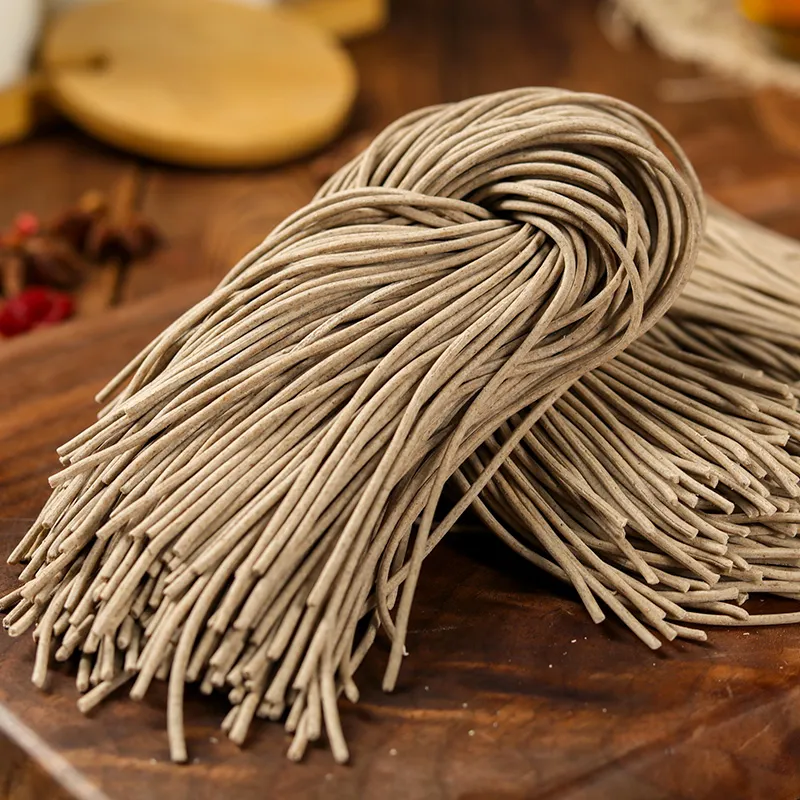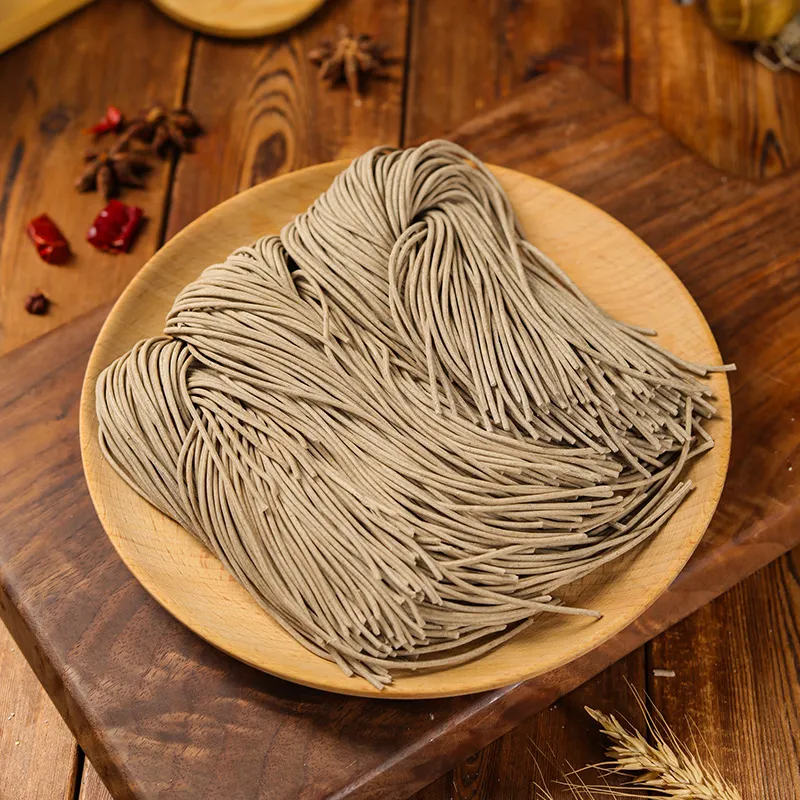Premium Organic Soba Noodles – Authentic Buckwheat, Healthy Choice
In recent years, organic soba noodles and their related variants, such as organic buckwheat soba noodles and organic buckwheat noodles, have gained immense attention among industry experts, health-conscious consumers, and culinary professionals worldwide. Leveraging evolving food processing technology, rigorous international standards, and growing demand for clean-label foods, this segment is seeing rapid growth and technical innovation.
Industry Trends & Market Data for Organic Soba Noodles
The global organic noodle market size reached USD 2.3 billion in 2023, with the organic soba noodles segment expanding at a CAGR of 8.6% from 2021 to 2024 (source). Major drivers include: increasing dietary restrictions (gluten-free, vegan), preference for traceable ingredients, and rising demand in food service and retail sectors.
| Year | Market Value (USD Million) | Growth Rate (%) |
|---|---|---|
| 2021 | 1,650 | 6.5 |
| 2022 | 1,820 | 10.3 |
| 2023 | 2,300 | 8.6 |
| 2024 (Est.) | 2,497 | 8.5 |
Technical Parameters: Organic Soba Noodles vs. Buckwheat Noodle Types
| Parameter | Organic Soba Noodles | Organic Buckwheat Soba Noodles | Organic Buckwheat Noodles |
|---|---|---|---|
| Main Ingredient | Organic Wheat + Buckwheat (Blend) | ≥80% Organic Buckwheat, ≤20% Organic Wheat |
100% Organic Buckwheat |
| Protein Content (%) | 7.2 - 9.0 | 10.6 - 13.0 | 12.1 - 14.0 |
| Gluten-Free | Partial | Low-Gluten | Yes |
| Texture | Firm, Chewy | Nutty, Slightly Grainy | Dense, Grainy |
| Certifications | USDA Organic, ISO 22000, FDA | USDA Organic, ISO 22000, FDA | USDA Organic, Gluten Free, FDA |
| Shelf Life | 24 months | 18 months | 18 months |
| Cooking Time | 4–6 min | 3–4 min | 4–5 min |
| Standard Compliance | ISO 22000, Halal, Kosher | ISO 22000, Halal | ISO 22000, Kosher |
Product Image: Premium Organic Soba Noodles

- Blended with high-grade organic buckwheat and select organic wheat
- Non-GMO, Low Sodium, No Chemical Additives
- Complies with ISO 22000 (Food Safety) & FDA (US) standards
- Suitable for vegan, vegetarian, and gluten-conscious diets
Technical Parameter Comparison
Manufacturing Process: How are Organic Soba Noodles Made?
Premium organic soba noodles are produced through a meticulous and standardized procedure that ensures safety, nutritional integrity, and product longevity. The process is closely monitored according to ISO 22000 and FDA food safety guidelines.
Certified wheat & buckwheat
Stone milled, mesh filtered
Water penetration with CNC mixers
Precision-shaped using CNC dies
Low-temp air drying (18hrs)
ISO 22000 & FDA Batch Checks
- Key highlights: Allergen tracing, moisture control, CNC-precision extrusion, use of RO-purified water, and rigorous batch sampling for gluten and microbiological safety.
- Final packaged products undergo pheromone/metal contamination screening (ANSI/ISO protocols).
Reference Video: Watch Traditional Soba Noodle Production (YouTube)
Main Technical Advantages of Premium Organic Soba Noodles
- Materials: Only certified organic buckwheat & wheat are used—both traceable to origin farms and free from pesticide residues (per USDA Organic Standard 7 CFR Part 205).
- Manufacturing Process: Advanced CNC extrusion and slow air drying (18-22 hours) create a uniform, resilient noodle structure with consistent hydration and texture.
- Shelf-Stability: Achieves 24-month shelf life due to ultra-low moisture packaging (below 12%), certified by ISO/FSSC batch testing.
- Food Safety: Full-trace batch code system, ISO 22000/FDA/SGS-audited facilities, and automated heavy metal screening ensure uncompromising safety.
- Custom Formulation: Can be tailored for specific protein/fiber levels, salt-free, or allergen-free formulations for institutional and retail clients.

Vendor Comparison: Organic Soba Noodles Global Suppliers
| Supplier | Location | Certifications | Gluten-Free Available | MOQ | Lead Time | Private Label Support |
|---|---|---|---|---|---|---|
| JX Semi-Dry Noodles | China | ISO 22000, USDA, FDA, Halal | Yes (100% Buckwheat) | 1,000kg | 15–18 Days | Yes |
| Hakubaku | Japan | JAS, FSSC 22000, Kosher | No | 2,000kg | 30 Days | Yes |
| King Soba | UK | Organic, Vegan, FDA | Yes | 500kg | 20 Days | Yes |
Customization: Tailored Organic Soba Noodles Solutions
- Formula Customization: Adjust buckwheat ratio, base grains, added vegetable powders, sodium content, or dietary fibers (resistant starch, prebiotic fibers).
- Shape & Sizing: CNC extrusion supports soba, flat, rounded, or fettuccine profiles (width: 1.6~4mm), precision up to ±0.1mm.
- Packaging: Single, multi-portion, or industrial bulk pack; private label, branding support, fully recyclable films available.
- Compliance: Custom batches can be tailored for FDA, EU, JAS, Halal, or Kosher certifications. Third-party testing (SGS, Intertek) on request.
| MOQ | 1,000kg (Standard) / Custom: Negotiable |
|---|---|
| Lead Time | 15–25 business days, based on order |
| Private Label | Supported: Yes (Full graphic, OEM/ODM) |
| R&D Support | Yes (Texture profiling, Stability studies) |
| Certifications | FDA, ISO 22000, BRC, Halal, Kosher, Organic |
Application Scenarios & Typical Use Cases
-
1. Institutional Catering:
Adopted by major universities and corporate canteens for high-volume, nutritionally complete, and allergen-monitored menus.
Feedback: "Taste-retaining and maintains elasticity after batch cooking." — Shanghai Foodservice Association -
2. Specialty Retail:
Sold under house brands in US/Europe/Japan supermarkets, benefiting from strong shelf life & attractive eco-pack.
Customer Review: "Consistent nutty flavor and cooks perfectly in 6 minutes." — UK Retail Buyer -
3. Premium Restaurant Chains:
Selected for chef-led fusion menus & vegan noodle bowls thanks to pleasing bite, excellent plating stability, and low residue. -
4. Meal Delivery Kits:
Used in home meal kits for consistent, hassle-free boiling; documented to retain over 83% texture integrity (unlike many generic dried noodles). -
5. Export/Global Trade:
Bulk delivery to over 36 countries with per-container111 lot traceability and compliance to local food safety laws.
Product Longevity, Compliance, and Testing Standards
- Shelf life: 24 months (vacuum pack, ≤12% moisture, UV-blocking film)
- Batch Testing: Microbiological safety, allergens (gluten if present), pesticide residue (GC-MS), heavy metals, peroxide index—all per ISO 22000:2018, FDA 21CFR120, and Codex Alimentarius.
- Third Party Audits: SGS, Intertek, Bureau Veritas.
- Export Compliance: Full US/EU/Japan/Halal documentation. Allergen disclosure per local laws.
- Packaging: Anti-migration, BPA/BPS-free, fully recyclable. Custom designs per customer requirements.
Customer Support, Warranty & Delivery
- Warranty: Batches are guaranteed for 24 months from date of production, if unopened.
- Delivery: Lead time typically 15–25 business days; global logistics support, with end-to-end tracking/barcoding.
- Customer Support: 24/7 support, technical FAQ, cooking trials, nutrition facts analysis available.
- Certificates Provided: Commercial invoice, certificate of origin, COA, third-party lab test reports.
- Quality Claims: Free replacement/refund if tested out-of-spec (with evidence).
Frequently Asked Technical Questions (FAQ)
1. What is the typical composition and why is buckwheat content important?
Organic soba noodles are traditionally a blend of organic buckwheat (typically 30–80%) with organic wheat. Higher buckwheat content offers increased protein and micronutrient density, but may reduce gluten (critical for texture). 100% buckwheat versions are gluten-free, sought by celiac or gluten-sensitive consumers.
2. What are the precise product dimensions and tolerant error?
Standard soba width: 1.6–2.5mm, thickness: 1.2mm; precision is ±0.1mm, ensured by CNC extrusion. Custom dimensioning can be made in consultation for premium/bespoke orders.
3. What major certifications are available?
USDA Organic, ISO 22000:2018, FDA, Halal, Kosher, and regional certifications (e.g., JAS in Japan, BRC Global Standard) are supported depending on market.
4. How do you ensure batch uniformity and allergen safety?
Batches are tested for gluten (where required), microbial safety (incl. Bacillus cereus, E. coli O157, Salmonella), heavy metals (Cd, Pb, Hg ISO 22000 protocols.
5. Are production lines exclusive to organic ingredients?
Yes, dedicated lines process only certified organic grains to prevent cross-contamination; lines are purged before batch runs. Full traceability is provided.
6. How is packaging certified and is it sustainable?
Packaging films are BPA/BPS-free, low migration, and suitable for food contact (per FDA 21CFR177). Recyclable and compostable packaging is available for private brands.
7. What is the protocol for product recall or failed batches?
If any batch is found out-of-spec (
Conclusion: Authority & Further Reading
The organic soba noodles industry is at the confluence of advanced food science, stringent safety standards, and health-driven innovation. Whether for institutional, retail, or chef-driven applications, these noodles deliver exceptional nutrition, flavor, and peace of mind—all backed by auditable production and regulatory rigor.
- [IFOAM: Organic Noodle Certification & Standards](https://www.ifoam.bio/if-ever/standards/standards-requirements)
- [FAO: Codex Alimentarius Noodle Guidelines](https://www.fao.org/fao-who-codexalimentarius/standards/en/)
- [Food Safety Magazine: Comparing Dry Pasta & Noodle Manufacturing](https://www.foodsafetymagazine.com/publications/)
- [USDA Organic Agriculture: Grain Traceability](https://www.usda.gov/topics/organic)
- [ISO 22000 Food Safety Standard](https://www.iso.org/iso-22000-food-safety-management.html)
For real chef discussions: ChefTalk: Organic Soba Noodles Supplier & Quality Forum
-
Is Whole Wheat Pasta Healthy?NewsMay.30,2025
-
Are Soba Noodles Good for Weight Loss?NewsMay.30,2025
-
Are Buckwheat Soba Noodles Healthy?NewsMay.30,2025
-
Are Buckwheat Soba Noodles Gluten Free?NewsMay.30,2025
-
Are Buckwheat Noodles Good for You?NewsMay.30,2025
-
A Healthy Way to Savor Soba and Spicy FlavorsNewsMay.30,2025
-
What Are Lanzhou Noodles?NewsMay.30,2025
Browse qua the following product new the we

















































































































